Research Reports
See all the research reports (93)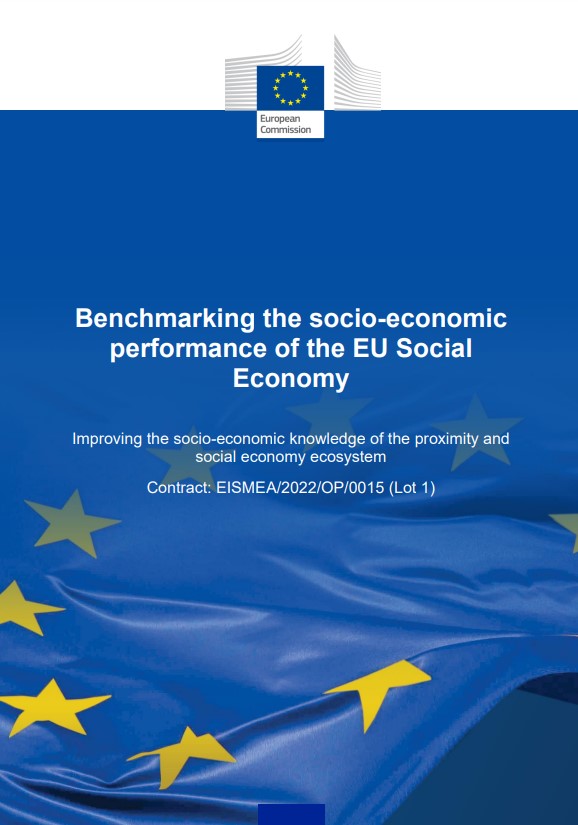
Benchmarking the socio-economic performance of the EU social economy
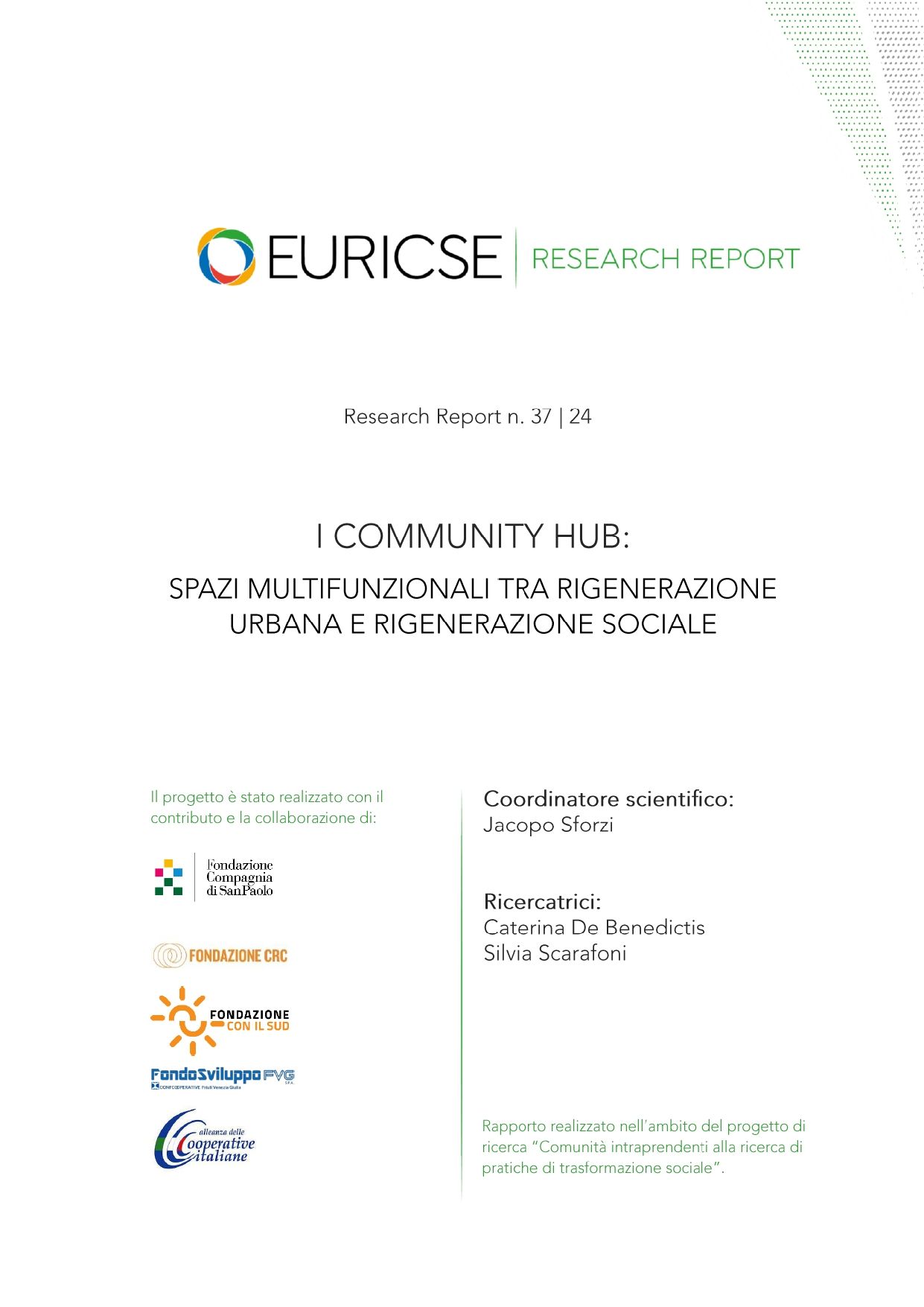
Community hubs: multifunctional spaces between urban regeneration and social regeneration
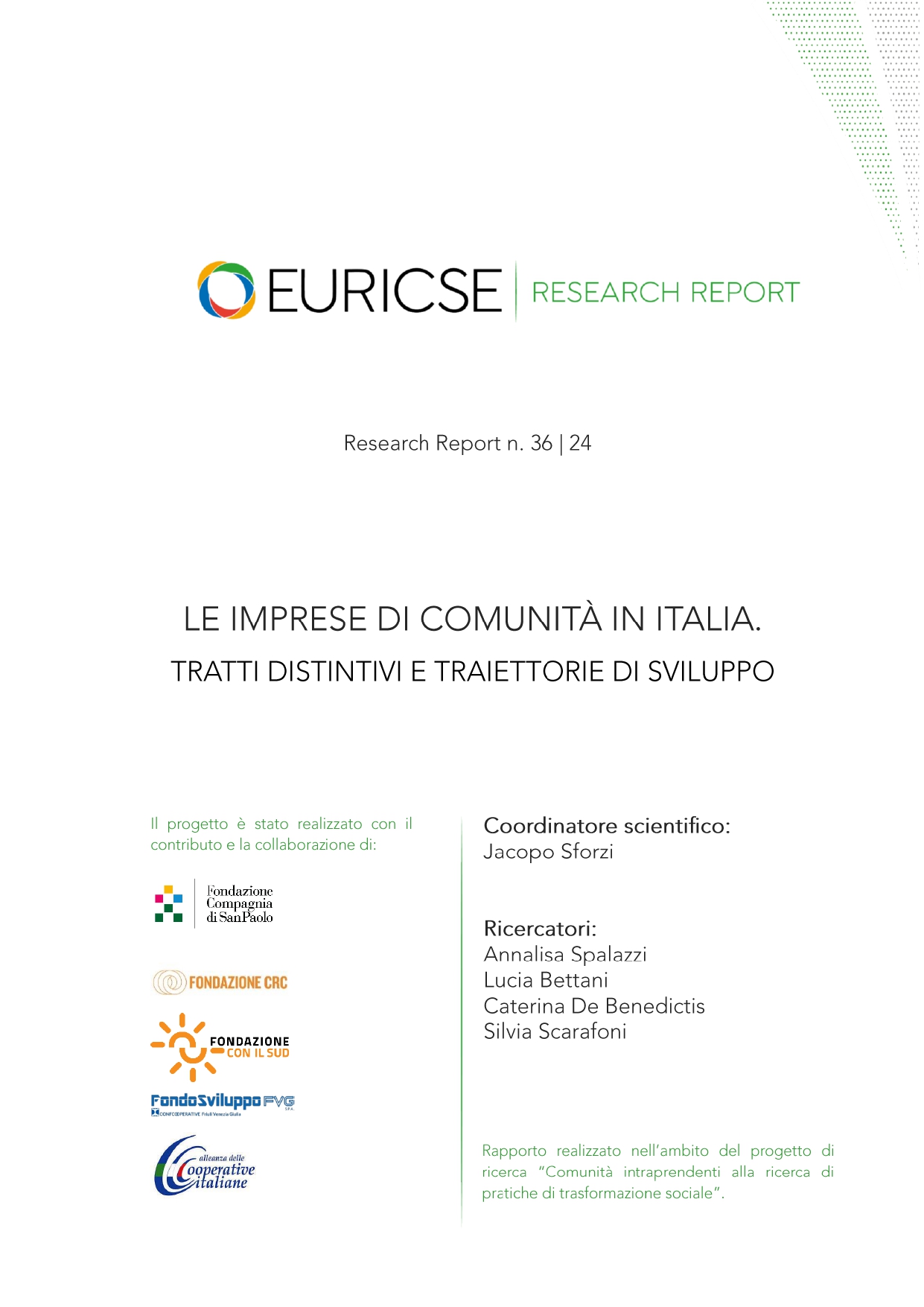
Community enterprises in Italy. Distinctive traits and development pathways
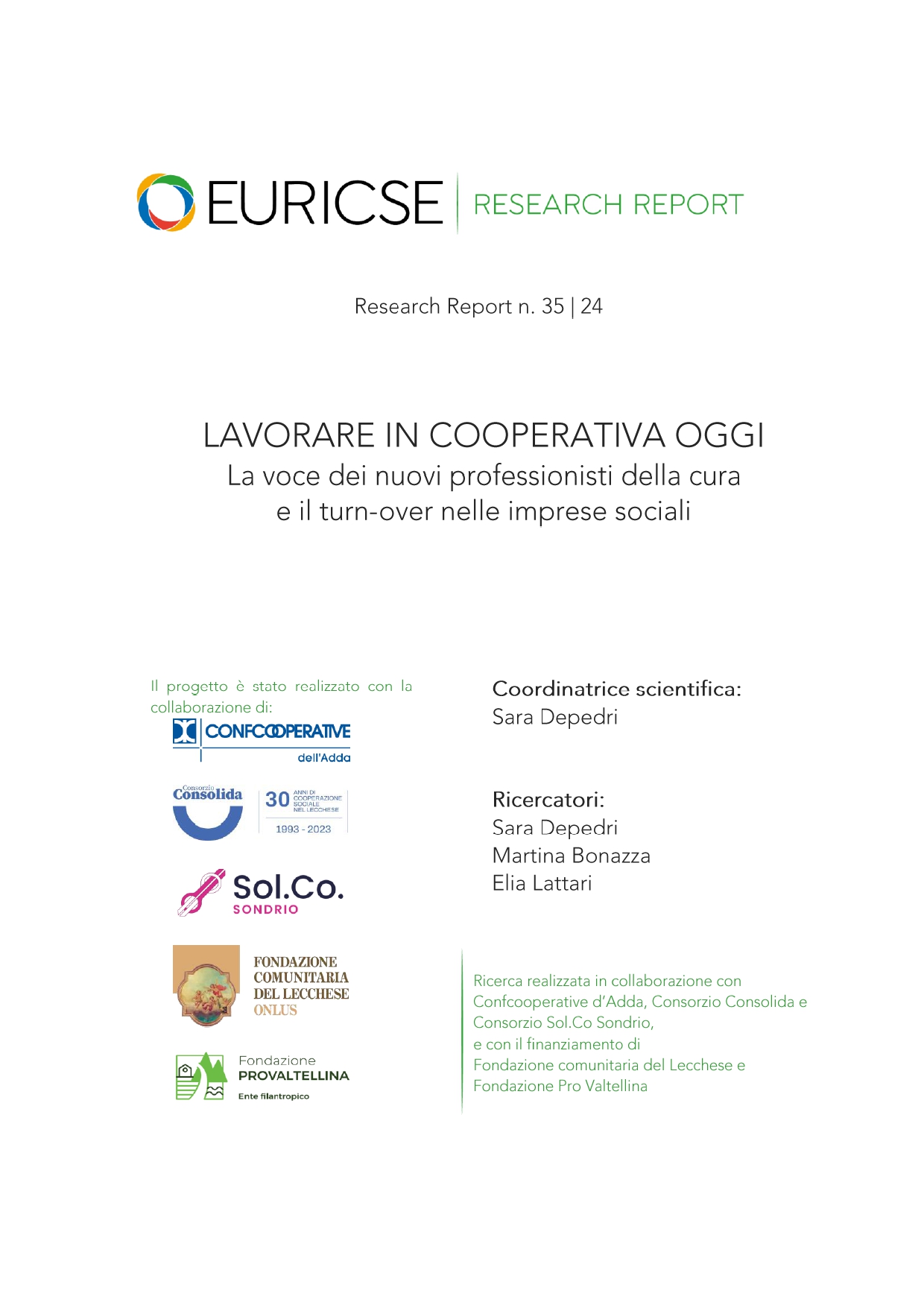
WORKING IN COOPERATIVES TODAY. The voice of new care professionals and turn-over in social enterprises
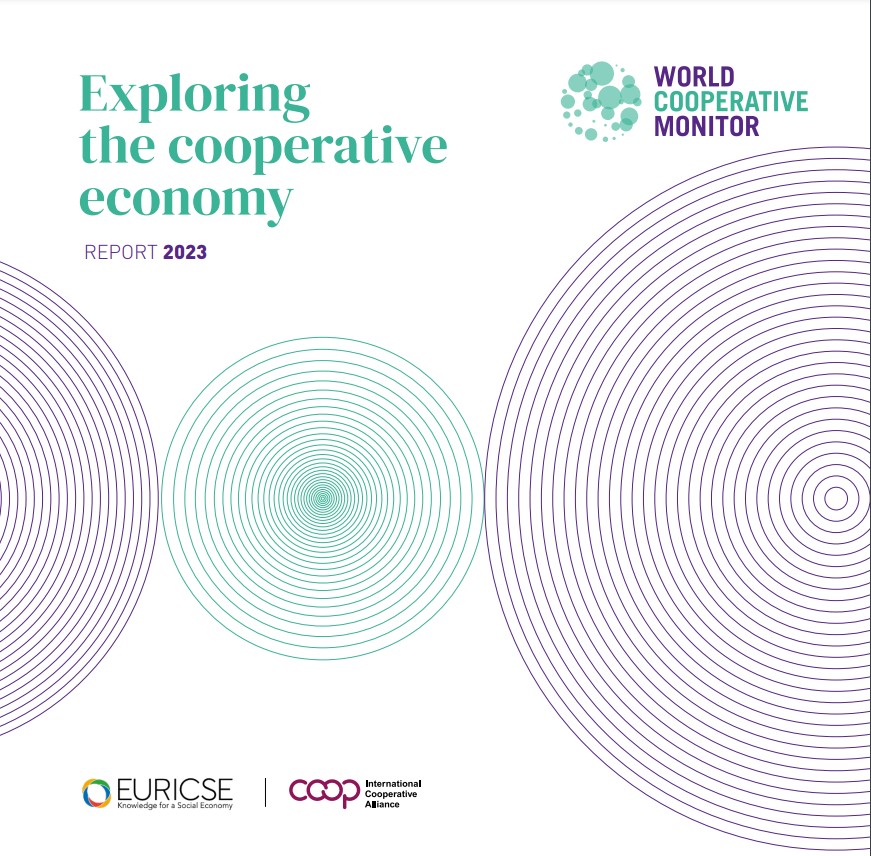
World Cooperative Monitor 2023
WP 133 | 24 On the concept and relevance of the social economy
WP 132 | 23 The vitality of people and places
WP 131 | 23 The role of shared administration in overcoming territorial polarisation processes
WP 130 | 23 The contribution of relational goods to the achievement of a sustainable common future. A comparative analysis of the social and solidarity economy and cryptocurrency trusts.
WP 129 | 23 The state of cooperative banking research in Europe and its future directions
WP 128 | 23 Social and health integration as the axis of a new model of care. The possible role of the Third Sector
WP 127 | 23 Practices and history of “Co- programming” and “Co-design” in Italy: the production of culture and music education in Trentino between public and private non-profits
WP 126 | 23 ”Shared administration” as a new relationship between the public sector and the social economy
WP 125 | 23 Social economy in Italy: dimensions, dynamics and characteristics
WP 124 | 22 The Social Economy in Trentino: an overview of the characteristics and dimensions
WP 123 | 22 The meaning of band making – Bands within the Trentino community
WP 122 | 22 The integration of sustainability in banking: from “greedy” to “green” finance
121 | 22 Financial services for poor farmers in Thailand: the case of the bank for agriculture and agricultural cooperatives (BAAC)
WP 120 I 22 Enterprises recovered by workers: cooperative practices and strategies
WP 119 | 22 Proximity and health: an introductory framework
WP 118 | 21 The employment performance of the Mondragon worker cooperatives 1983-2019
WP 117 | 21 The capital structure of co-operative firms: an international comparative study
WP 116 | 20 The “Care is Home” experience: a partnership between public, private and citizenship for innovation in home care support
WP 115 | 20 Linking of credit cooperatives with local societies: the Indian experience
WP 114 | 20 Community archaeology: the case of Scherìa cooperative community in Tiriolo (CZ) as a new reference model
WP 113 | 20 The performance of cooperatives and corporations from 2008 to 2015 in the provinces of Trento and Bolzano
WP 112 | 20 The economic significance of the Third Sector: the situation and impact of reform
WP 111 | 20 Homo Oeconomicus at the cafè: a field experiment on “suspended coffee”
WP 110 | 20 Finance, property rights and productivity in Italian cooperatives
WP 109 | 19 The institutions of livelihood and social enterprise system
WP 108 | 19 Cooperation as a tool for the emancipation of the working classes in the thought of 19th century English economists
WP 107 | 19 Conflict between communities, citizen ownership and the production of public goods
WP 106 | 19 The potential of the Trust as the institutional vehicle of choice for empowering the Third Sector in the recovery and enhancement of cultural heritage
WP 105 | 18 Urban regeneration and social innovation: The case of Gillet Square, a community-driven urban culture project
WP 104 | 18 Advancing statistics on cooperatives: Reflections on six country case studies
WP 103 | 18 Cooperatives and Taxation: How many Benefits do they really have? The Italian Case
WP 102 | 18 Agricultural cooperation and marginal areas: A reflection on the experience of the Province of Trento
WP 101 | 18 Public assets concession contracts between local authorities and third sector organisations
WP 100 | 18 Non-profits and the Profit Non-distribution Constraint with Selfish Entrepreneurial Motivations
WP 99 | 17 Democratic Governance Mechanisms in Cooperative Banks: A Reassessment
WP 98 | 17 The Foundations of the “Public” Organisation: Strategic Control and the Problem of the Costs of Exclusion
WP 97 |17 Strategies for Repositioning the Social and Solidarity Economy in the Consumption Patterns of the “Great Contraction”
WP 96 | 17 Social Enterprise in Italy: Typology, Diffusion and Characteristics
WP 95 | 17 The Comparative Advantages of Single and Multi-stakeholder Cooperatives
WP 94 | 17 A Knowledge-based Vision of the Agricultural Cooperative: The St. Ursula Case
WP 93 | 17 Selected Aspects of Social Cooperatives in Poland
WP 92 | 17 The Institutions of Governance. A Framework for Analysis
WP 91 | 17 The Modern Agricultural Cooperative: A Cognitive-Knowledge- Based Approach
WP 90 | 17 The Firm as a Common. The Case of the Accumulation and Use of Capital Resources in Co-operative Enterprises
WP 89 | 16 Governance for a “socialised economy”. A case study in preventive health and work integration
WP 88 | 16 Social Enterprise: Social Co-operation in the Italian Welfare System and its Reproduction in Europe
WP 87 | 16 How communities can regenerate urban contexts: The case study of Hackney Co-operative Development
WP 86 | 16 Governance and Member Participation in Labor Cooperatives
WP 85 | 16 The Role of Nonprofit Institutions in Provinces with Greater Employment Fragility
WP 84 | 16 Marco Legal y Desarrollo del Cooperativismo de Crédito en Argentina, 1887-2015
WP 83 | 15 The Spirit of the Law over its Letter: The Role of Culture and Social Norms in Shielding Cooperative Banks from Systemic Shocks
WP 82 | 15 Recognition and Legal Forms of Social Enterprise in Europe: A Critical Analysis from a Comparative Law Perspective
WP 81 | 15 The relevance and economic sustainability of the social economy in Italy
WP 80 | 15 Social and political embeddedness of Argentina’s worker- recuperated enterprises: a brief history and current trends
WP 79 | 15 The Operational Effectiveness of Italian Foundations of Banking Origin: An Empirical Analysis.
WP 78 | 15 The Italian Road to Creating Worker Cooperatives from Worker Buyouts: Italy’s Worker-Recuperated Enterprises and the Legge Marcora Framework
WP 77 | 15 Community and cooperation: the evolution of cooperatives toward new models of democratic citizen participation in the management of public services
WP 76 | 15 Was the Crisis Due to a Shift from Stakeholder to Shareholder Finance? Surveying the Debate
WP 75 | 15 Why Social Enterprises are asking to be multi-stakeholder and deliberative: an explanation around the costs of exclusion
WP 74 | 14 Social Enterprise in Ireland: The Camara Education Experience
WP 73 |14 De la Economía Popular a la Economía Social y Solidaria: el Caso de los Recicladores de Base en Santiago de Chile
WP 72 | 14 Groups and Trust: Experimental Evidence on the Olson and Putnam Hypotheses
WP 71 | 14 The International Year of Cooperatives and the 2020 Vision
WP 70 | 14 Pricing and Price Regulation in a Customer-Owned Monopoly
WP 69 | 14 Europe in Transition: The Role of Social Cooperatives and Social Enterprises
WP 68 | 14 Community Enterprises in Urban Regeneration Policies: Defining and Framing the Italian Context.
WP 67 | 14 Costumer Ownership and Quality Provision in Public Services under Asymmetric Information
WP 66 | 14 A “human growth” perspective on organizational resources, worker satisfaction and firm performance
WP 65 | 14 Cost efficiency and outreach of microfinance institutions in Ethiopia: Do they contrast with financial cooperatives?
WP 64 | 14 Wine cooperatives between tradition and efficiency: A reflection on the Italian case
WP 63 | 14 Community and cooperation: the evolution of cooperatives towards new models of citizens’ democratic participation in public services provision
WP 62 | 13 The Internal and External Governance of Cooperatives: Membership and Consistency of Values
WP 61 | 13 Social entrepreneurship in Croatia: a framework for development
WP 60 | 13 The degree of awareness of the Small Business Act and industrial policy measures and the recent economic performance of Italian cooperative enterprises: key findings from a qualitative survey
WP 59 | 13 Exploring the performance of social cooperatives during the economic crisis: the italian case
WP 58 | 13 MAPISER, the development of a social holding company. Seeking (and finding) social business opportunities
WP 57 | 13 Restructured agricultural cooperative marketing system in Uganda
WP 56 | 13 Financial sustainability and outreach of microfinance institutions in Ethiopia: does organizational form matter?
WP 55 | 13 The emergence of the empresas recuperadas por sus trabajadores
WP 54 | 13 Disentangling the relationship between nonprofit and social capital
WP 53 | 13 Worldwide regulation of co-operative societies – an Overview
WP 52 | 13 Collective institutions towards habitability: roles, strategies and forms of governance
WP 51 | 13 The performance of service cooperatives during the crisis: an analysis during 2009-2011
WP 50 | 13 Impact of agricultural cooperatives on smallholders’ technical efficiency: evidence from Ethiopia
WP 49 | 13 Cooperative economy: an innovative approach to sustainability
WP 48 | 13 Mutualism and peer monitoring in Italian BCCs
WP 47 | 13 Pan-European cooperative law: Where do we stand?
WP 46 | 13 Cooperative’s concern for the community: from members towards local communities’ interest
WP 45 | 12 Cooperative finance and cooperative identity
WP 44 | 12 Cooperative enterprises and network contracts: Key findings from a qualitative survey
WP 43 | 12 Do cooperative enterprises create social trust?
WP 42 | 12 Social enterprise projects as urban regeneration strategies: spaces and methods for social innovation
WP 41 | 12 Co-operation as a remedy in times of crisis: agricultural co-operatives in the world
WP 40 | 12 Governance in cooperative enterprises. The case of the member cooperatives of Legacoopservizi
WP 39 | 12 Mondragón: how to combine economic success and cooperative values
WP 38 | 12 The “made in Switzerland” social enterprise model. Results of a nationwide exploratory survey.
WP 37 | 12 Cooperation in times of crisis
WP 36 | 12 What to make of social innovation? Towards a framework for policy development
WP 35 | 12 The Italian social cooperatives in 2008: A portrait using descriptive and principal component analysis
WP 34 | 12 Innovative private-public partnerships
WP 33 | 12 Stakeholder orientation and capital structure: Social enterprises versus for-profit firms in the Italian social residential service sector
WP 32 | 12 From mutual aid societies to mutual aid. Responses to the welfare crisis
WP 31 | 12 Credit cooperatives: challenges and opportunities in the new global scenario
WP 30 | 12 Evaluation of the economic and financial sustainability of the system of care services for non-self-sufficient elderly people: The case of the Province of Trento
WP 29 | 12 Cooperatives: a development strategy? An analysis of argan oil cooperatives in Southwest Morocco
WP 28 | 12 The Stubai cooperative: using local roots for global competitiveness
WP 27 | 12 Social cooperation in Italy: an overview
WP 26 | 12 Cooperation in Italy in 2008
WP 25 | 12 The flexibility of the cooperative model as a development tool: the case of an Italian region
WP 24 | 12 New Study Group on European Cooperative Law: “Principles” project
WP 23 | 12 Cooperative identity and the law
WP 22 | 11 La cooperaciòn en Trentino: un modelo construido a través de 120 años de transformaciones
WP 21 | 11 Las empresas sociales y cooperativas dentro del nuevo paradigma: porque en Europa la realidad niega la ideología
WP 20 | 11 Le cooperative in campo educativo: dimensioni del fenomeno e ruolo della cooperazione sociale
WP 19 | 11 The development needs of social enterprise. An analysis starting from the “Women&Work” call
WP 18 | 11 Measuring the economic efficiency of Italian agricultural enterprises
WP 17 | 11 What differences does a century make? Considering some crises in the international cooperative movement, 1900 and 2000
WP 16 | 11 Cooperative credit network: advantages and challenges in italian cooperative credit banks
WP 15 | 11 Capital formation in new cooperatives in China: policy and practice
WP 14 | 11 The social cooperation business system. Origins and development of social cooperative consortia
WP 13 | 10 New welfare policy instruments: international experiences and implications for social enterprises
WP 12 | 10 Incentives, job satisfaction and performance: empirical evidence in italian social enterprises
WP 11 | 10 The roots of cooperative credit from a theoretical and historical perspective
WP 10 | 10 Analysis of the characteristics of the management process of the Volunteer Service Centers (CSV) from a stakeholder management perspective
WP 09 | 10 The economic impact of cooperation in the province of Trento
WP 08 | 10 Reconceptualising the third sector: toward a heterodox perspective
WP 07 | 10 Mission, strategies and performance evaluation of nonprofit companies in a stakeholder management approach
WP 06 | 10 Defining the nonprofit sectors in Japan and England & Wales: A comparative assessment of common versus civil law
WP 05 | 10 Working in the profit versus not for profit sector: what difference does it make? An inquiry on preferences of voluntary and involuntary movers
WP 04 | 10 Employment protection in worker cooperatives: tools and motivations. Analysis of a group of cooperatives in Ravenna
WP 03 | 10 The Growth of Organizational Variety in Market Economies: The Case of Social Enterprises
WP 02 | 09 Italian Co-operative Law Reform and Co-operative Principles
WP 01 | 09 Financial Deregulation and Economic Distress: Is There a Future for Financial Co-operatives?
WP 00 | 09 The role of cooperative and social enterprises: A multifaceted approach for an economic pluralism
Books
See all the books (28)
PRACTICAL GUIDE TO CO-PLANNING AND CO-DESIGN. STRATEGIES AND TOOLS FOR BUILDING COLLABORATIVE AGENDAS

THE SOCIAL ENTERPRISE REVOLUTION. FOR A RENEWED PROTAGONISM OF CIVIL SOCIETY

GIVING SPACE. CIVIL SOCIETY AND PUBLIC POLICY

Work integration and network contracts
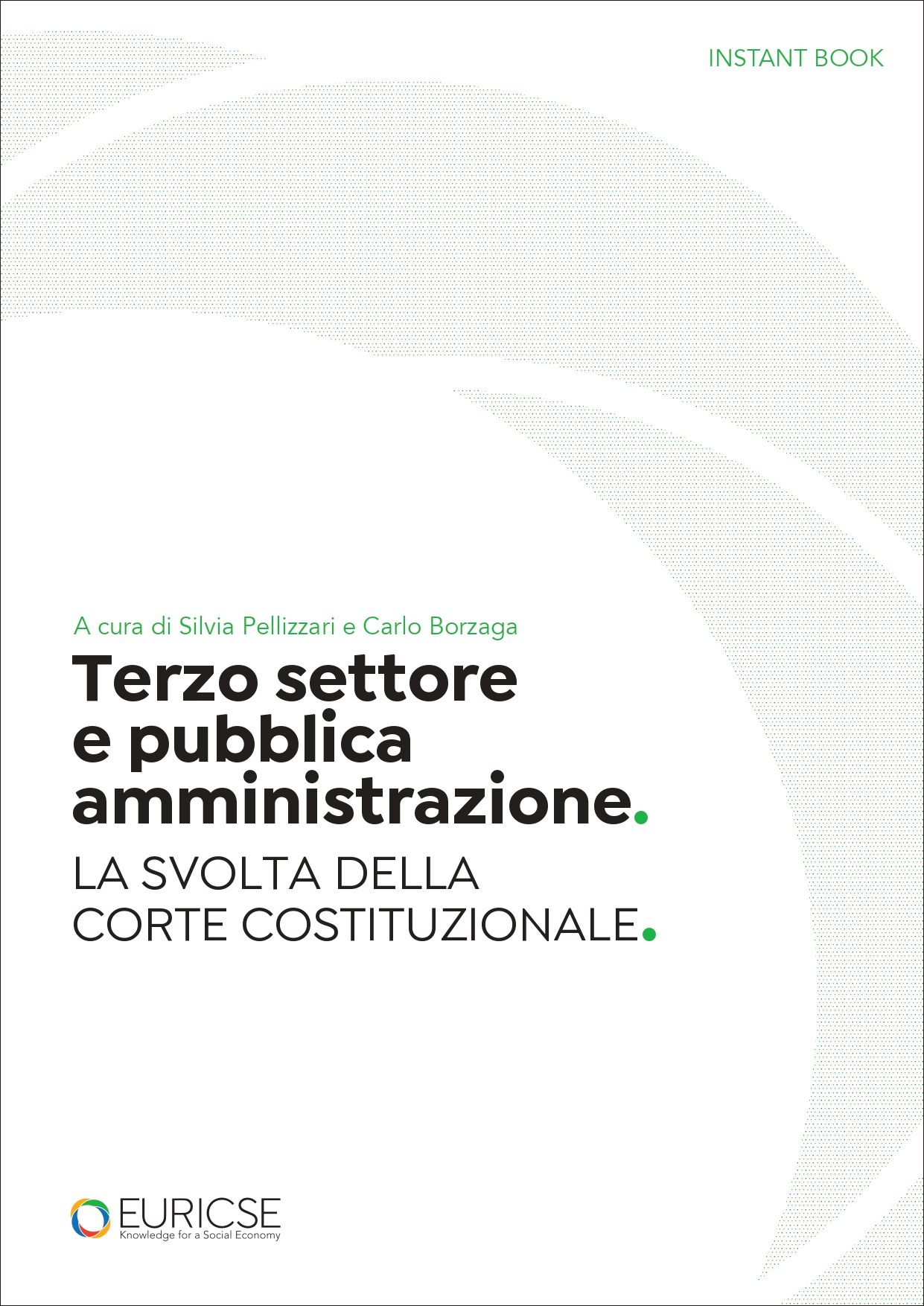
Third sector and public administration. The turning point of the Constitutional Court
Documents
See all the documents (23)Migrants, Refugees and the Social and Solidarity Economy
The Finance Sector and the Social and Solidarity Economy
Financing the Social and Solidarity Economy
Contribution on the KPIs to monitor the implementation of industrial strategy

The Journal of Entrepreneurial and Organizational Diversity (JEOD) is an international scientific journal published by Euricse. The focus is on theoretical and empirical research on different enterprise types and organizational models, including (but not limited to) social enterprises, cooperatives, mutuals, nonprofit organizations and foundations. It places strong emphasis on their institutional and socio-economic contexts, as well as on their organizational features, practices, stakeholders and the development of communities and localities. JEOD also welcomes comparative research between different organizations and enterprise types, including different ownership and governance models, corporate social responsibility and network types.
All articles are available online, at the journal’s official website.